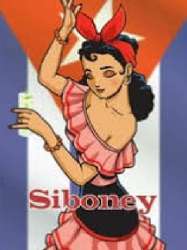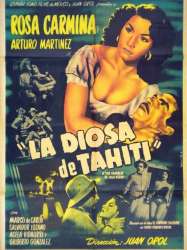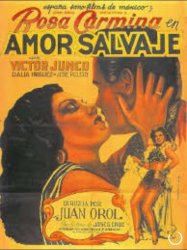Juan Orol est un Acteur, Réalisateur, Ecrivain, Producteur et Assistant Director Mexicain né le 4 aout 1897

Juan Rogelio García García, better known as Juan Orol (August 4, 1897 in Lalín, Pontevedra, Spain – May 26, 1988 in Mexico City, Mexico) was a Mexican-Spanish actor, producer, screenwriter and film director. He was known as The King of the Mexican Film noir. He was also known as The Involuntary Surrealist. He was a pioneer of the Mexican cinema's first talkies and one of the main promoters of the Rumberas film in the Golden Age of Mexican cinema. His films have been described as cult films.
Juan Rogelio García García was born on August 4, 1897 in the parish of Santiso, in the town of Lalin in Pontevedra, Spain. His father was a commander of the Spanish armed forces. His mother, a woman of peasant origin, was a single mother. Later, she married a man who didn't want to take care of another man's son, so she sent Orol to Cuba to live with a friend.
In Cuba, Orol lived in the low neighborhoods, known in Cuba as "solares". There, he had a lot of contact with people of African origin, who taught him all his dance techniques. Young Orol had many occupations at the same time: boxer, mechanic, racing driver, journalist, actor, bullfighter and police officer. He abandoned boxing when his face was disfigured. In his racer role, was about to drive in Indianapolis, but he lacked a few tenths to the mark of 118 miles per hour. In his role as a bullfighter, he passed through South America under the name of Espartero or Esparterito. Later, he moved to Mexico, where he was also part of the secret police. His biography is absolutely bizarre, full of impossible and unconnected episodes. But despite his poor cultural training, he survived. His steps in the bullfight arena and the police order were a great inspiration for subsequent film work. His premature widowhood put on face with a parental responsibility. He started working on the radio as artistic director and publicist while he contacting with the nascent Mexican film industry.
Career
Initially Orol entered the Mexican film industry as another way to make a living, but eventually he developed a passion for the world of cinema. Orol debuted in the Cinema of Mexico as a supporting actor in the film Sagrario (1933), made by the newly created Aspa Films under the direction of Ramón Peon, also known as the Cuban Griffith. The following year, Orol risked his own capital and premiered simultaneously as producer, writer and star in the film Mujeres sin alma, also directed by Peon. He debuted as director in the film Madre querida (1935), the third production of Aspa Films. Orol was a devotee of American Film noir, and had a great admiration for the famous film gangsters of the 1930s and 1940s: Edward G. Robinson, James Cagney and Humphrey Bogart. However, Orol himself recognized José Bohr, one of the pioneers of talkies in Mexico, as the most influential filmmaker.
After his first film made modest earnings, he filmed a second film in 1934, where he served as co-director with Ramon Peon: Mujeres sin alma, ¿venganza suprema?, which was an unexpected success and starred his first filmic muse, Consuelo Moreno. Orol's films developed a signature style, with the recurring themes of the tropics, the rumberas, exotic landscapes, beautiful and provocative women and the cabaret as an ideal location. These hooks allowed Orol to attract an audience to his films. He later introduced gangsters to his repertoire. On many occasions, to outwit the film unions of Mexico, he invented co-productions with other countries, primarily with Cuba.
In the mid-forties, he consolidated his own production house, España Sono Films. Likewise, he created in Cuba the Caribe Films production company, helping him to make his co-productions with the island. Orol filmed in different countries: Mexico, Cuba, Puerto Rico, the United States, and Spain. Juan Orol had also a "one man band" performance in movies. In most of them, he participated in more than two or three of the main activities of the film: production manager, director, producer, screenwriter and actor.
The first Orol production in the Cuban cinema was Siboney (1938), which features music by Ernesto Lecuona. Orol acted as director, producer, screenwriter and actor. In this film, the Cuban rumbera María Antonieta Pons, his second filmic muse, debuted.
With María Antonieta Pons, Orol made films like Cruel destino (1944), Los misterios del hampa (1945), Embrujo antillano (1946) and Pasiones tormentosas (1947). Although Pons and other of his subsequent filmic muses were exclusive stars of España Sono Films, Orol allowed them to work with other production houses. Pons was the first major rumbera of the Mexican Cinema. Because of this, Orol was considered one of the main promoters of the Rumberas film of the forties and fifties. After his break with Pons, Orol made the film El amor de mi bohío (1946), starring the Costa Rican actress Yadira Jimenez in the lead role. However, Jimenez failed to develop a relevant film relationship with Orol. In search of a new female star of his films, Orol moved to Cuba, where he discovered what would be his next filmic muse: Rosa Carmina.
Rosa Carmina debuted in the film Una mujer de Oriente (1946). She become the most representative and prolific filmic muse of Orol. Both filmed together sixteen films between 1946 and 1955. Probably the most notable are the classic Gangsters Versus Cowboys (considered today as a Cult film) and Sandra, la mujer de fuego. Other relevant films of Orol with Rosa Carmina are Tania, la bella salvaje (1947), Amor salvaje (1949) the trilogy Percal (1951) (based on a comic book by José G. Cruz); La diosa de Tahití (1953) and Secretaria peligrosa (1955).
After separating from Rosa Carmina, Orol filmed La mesera coja del café del puerto, a Cuban-Mexican production, as director, producer and screenwriter, with Marta Rams and Julio Capote as main actors. In the same year, Orol was introduced to his next filmic muse: Mary Esquivel. Esquivel debuted in the film Zonga, el ángel diabólico (1956), a film that was also the first movie Orol filmed in color. His last major production involving Esquivel was Tahimí, la hija del pescador (1958).
Eventually, Orol met his last filmic muse, Dinorah Judith, with whom he directed his last films. At this time, the films of Orol were panned by critics, and reputedly, the director went through a deep depression. His films during this period include La maldición de mi raza (1964), Antesala de la silla elèctrica (1966) and the cult classic El fantástico mundo de los hippies (1970), made with American co-production. His last film as director was El tren de la muerte (1978). The last appearance of Juan Orol on the big screen as an actor was in the film Ni modo...así somos (1981). He made a cameo as himself, in a brief scene lasting under a minute.
In his later years Orol lived in a deep depression. Despite various film tributes in his honor, he lived in a deep poverty. He assumed that his film collection had succumbed to the fire at the National Film Archives of Mexico (Cineteca Nacional) in 1982. In fact, only some original negatives of his early films were lost in that incident.
He died of liver disease in Mexico City on May 26, 1988.
Source : Wikidata
Juan Orol

Nom de naissance Juan Rogelio García García
Nationalité Mexique
Naissance 4 aout 1897
Mort 26 mai 1988 (à 90 ans) à Mexico (Mexique)
Nationalité Mexique
Naissance 4 aout 1897
Mort 26 mai 1988 (à 90 ans) à Mexico (Mexique)
Biographie
Early lifeJuan Rogelio García García was born on August 4, 1897 in the parish of Santiso, in the town of Lalin in Pontevedra, Spain. His father was a commander of the Spanish armed forces. His mother, a woman of peasant origin, was a single mother. Later, she married a man who didn't want to take care of another man's son, so she sent Orol to Cuba to live with a friend.
In Cuba, Orol lived in the low neighborhoods, known in Cuba as "solares". There, he had a lot of contact with people of African origin, who taught him all his dance techniques. Young Orol had many occupations at the same time: boxer, mechanic, racing driver, journalist, actor, bullfighter and police officer. He abandoned boxing when his face was disfigured. In his racer role, was about to drive in Indianapolis, but he lacked a few tenths to the mark of 118 miles per hour. In his role as a bullfighter, he passed through South America under the name of Espartero or Esparterito. Later, he moved to Mexico, where he was also part of the secret police. His biography is absolutely bizarre, full of impossible and unconnected episodes. But despite his poor cultural training, he survived. His steps in the bullfight arena and the police order were a great inspiration for subsequent film work. His premature widowhood put on face with a parental responsibility. He started working on the radio as artistic director and publicist while he contacting with the nascent Mexican film industry.
Career
Initially Orol entered the Mexican film industry as another way to make a living, but eventually he developed a passion for the world of cinema. Orol debuted in the Cinema of Mexico as a supporting actor in the film Sagrario (1933), made by the newly created Aspa Films under the direction of Ramón Peon, also known as the Cuban Griffith. The following year, Orol risked his own capital and premiered simultaneously as producer, writer and star in the film Mujeres sin alma, also directed by Peon. He debuted as director in the film Madre querida (1935), the third production of Aspa Films. Orol was a devotee of American Film noir, and had a great admiration for the famous film gangsters of the 1930s and 1940s: Edward G. Robinson, James Cagney and Humphrey Bogart. However, Orol himself recognized José Bohr, one of the pioneers of talkies in Mexico, as the most influential filmmaker.
After his first film made modest earnings, he filmed a second film in 1934, where he served as co-director with Ramon Peon: Mujeres sin alma, ¿venganza suprema?, which was an unexpected success and starred his first filmic muse, Consuelo Moreno. Orol's films developed a signature style, with the recurring themes of the tropics, the rumberas, exotic landscapes, beautiful and provocative women and the cabaret as an ideal location. These hooks allowed Orol to attract an audience to his films. He later introduced gangsters to his repertoire. On many occasions, to outwit the film unions of Mexico, he invented co-productions with other countries, primarily with Cuba.
In the mid-forties, he consolidated his own production house, España Sono Films. Likewise, he created in Cuba the Caribe Films production company, helping him to make his co-productions with the island. Orol filmed in different countries: Mexico, Cuba, Puerto Rico, the United States, and Spain. Juan Orol had also a "one man band" performance in movies. In most of them, he participated in more than two or three of the main activities of the film: production manager, director, producer, screenwriter and actor.
The first Orol production in the Cuban cinema was Siboney (1938), which features music by Ernesto Lecuona. Orol acted as director, producer, screenwriter and actor. In this film, the Cuban rumbera María Antonieta Pons, his second filmic muse, debuted.
With María Antonieta Pons, Orol made films like Cruel destino (1944), Los misterios del hampa (1945), Embrujo antillano (1946) and Pasiones tormentosas (1947). Although Pons and other of his subsequent filmic muses were exclusive stars of España Sono Films, Orol allowed them to work with other production houses. Pons was the first major rumbera of the Mexican Cinema. Because of this, Orol was considered one of the main promoters of the Rumberas film of the forties and fifties. After his break with Pons, Orol made the film El amor de mi bohío (1946), starring the Costa Rican actress Yadira Jimenez in the lead role. However, Jimenez failed to develop a relevant film relationship with Orol. In search of a new female star of his films, Orol moved to Cuba, where he discovered what would be his next filmic muse: Rosa Carmina.
Rosa Carmina debuted in the film Una mujer de Oriente (1946). She become the most representative and prolific filmic muse of Orol. Both filmed together sixteen films between 1946 and 1955. Probably the most notable are the classic Gangsters Versus Cowboys (considered today as a Cult film) and Sandra, la mujer de fuego. Other relevant films of Orol with Rosa Carmina are Tania, la bella salvaje (1947), Amor salvaje (1949) the trilogy Percal (1951) (based on a comic book by José G. Cruz); La diosa de Tahití (1953) and Secretaria peligrosa (1955).
After separating from Rosa Carmina, Orol filmed La mesera coja del café del puerto, a Cuban-Mexican production, as director, producer and screenwriter, with Marta Rams and Julio Capote as main actors. In the same year, Orol was introduced to his next filmic muse: Mary Esquivel. Esquivel debuted in the film Zonga, el ángel diabólico (1956), a film that was also the first movie Orol filmed in color. His last major production involving Esquivel was Tahimí, la hija del pescador (1958).
Eventually, Orol met his last filmic muse, Dinorah Judith, with whom he directed his last films. At this time, the films of Orol were panned by critics, and reputedly, the director went through a deep depression. His films during this period include La maldición de mi raza (1964), Antesala de la silla elèctrica (1966) and the cult classic El fantástico mundo de los hippies (1970), made with American co-production. His last film as director was El tren de la muerte (1978). The last appearance of Juan Orol on the big screen as an actor was in the film Ni modo...así somos (1981). He made a cameo as himself, in a brief scene lasting under a minute.
In his later years Orol lived in a deep depression. Despite various film tributes in his honor, he lived in a deep poverty. He assumed that his film collection had succumbed to the fire at the National Film Archives of Mexico (Cineteca Nacional) in 1982. In fact, only some original negatives of his early films were lost in that incident.
He died of liver disease in Mexico City on May 26, 1988.
Le plus souvent avec
Filmographie de Juan Orol (8 films)
Acteur

El reino de los gángsters (1948)
, 2h2Réalisé par Juan Orol
Genres Drame, Thriller, Policier
Acteurs Rosa Carmina, Roberto Cañedo, Roberto Corell, Juan Orol, Lilia Prado

Siboney (1940)
Réalisé par Juan Orol
Genres Drame
Acteurs María Antonieta Pons, Juan Orol
Rôle Gastón de Montero
In 1868, while develops the Cuban War of Independence, Gaston de Montero (Juan Orol), a noble Spanish knight, rescues a young girl named Siboney (María Antonieta Pons) and he helps her to become in a successful dancer. Over time, she discovers that she is the daughter of a prominent aristocrat.

Carnival in Paris (1937)
, 1h19Réalisé par Juan Orol
Genres Comédie, Musical, Romance
Thèmes Gangsters
Acteurs Rosa Carmina, Henry Brandon, Juan Orol, Ann Rutherford, Ferdinand Gottschalk, Tom Ricketts
Rôle Johnny Carmenta
Note60%





The Gangster Johnny Carmenta (Juan Orol), faces Pancho Dominguez El Charro del Arrabal (Jose Pulido), who has imposed his law in the town. The Rumbera Rosa (Rosa Carmina) seduces both men firing their rivalry.
Réalisateur

Pasiones infernales (1966)
Réalisé par Juan Orol
Genres Drame, Romance
Acteurs Esther Sandoval
The movie deals with racism in the Latino community. It concentrates on racial differences between groups of Whites and Blacks-Mestizo in a Spanish-speaking island.

Sandra, the Woman of Fire (1954)
Réalisé par Juan Orol
Genres Drame, Romance
Thèmes Gangsters
Acteurs Rosa Carmina, Arturo Martínez, César del Campo
Note61%





Haunted by her past, the famous cabaret singer Sandra (Rosa Carmina) decides to get away and marries Don Miguel Olazabal (Manuel Arvide), a wealthy landowner. The impossibility of her husband to consummate their marriage causes a burning passion in Sandra, passion aroused in all men around her. Quickly she discovers that can not escape of her past, because wherever she go, life of crime who she lived in the past continue to haunt.

La diosa de Tahití (1953)
, 1h39Réalisé par Juan Orol
Genres Drame, Policier
Acteurs Rosa Carmina, Arturo Martínez
Note56%





Paula (Rosa Carmina), the biggest star of a cabaret located on some exotic island of the South Seas, harbor a fugitive who starts a dangerous adventure that compromises her safety, in a bitter struggle between smugglers and military.

Amor salvaje (1950)
, 1h26Réalisé par Juan Orol
Genres Drame, Romance
Acteurs Rosa Carmina, Víctor Junco, Victorio Blanco
Note42%





Alma Luz (Rosa Carmina) leaves Panama to go live with her aunt Antonia (Dalia Iñiguez) and Manuel (Victor Junco), her husband in México. There she meets Julio (José Pulido), who tries to conquer her, but she rejects him because she is in love with Manuel. Julio to learn the relationship between her and her uncle, faces Manuel causing a tragedy.

El reino de los gángsters (1948)
, 2h2Réalisé par Juan Orol
Genres Drame, Thriller, Policier
Acteurs Rosa Carmina, Roberto Cañedo, Roberto Corell, Juan Orol, Lilia Prado

Embrujo antillano (1946)
Réalisé par Juan Orol
Genres Drame, Musical
Acteurs María Antonieta Pons, Blanquita Amaro
A young girl tired of working in the cultivation of tobacco with her father in Pinar del Rio, Cuba, decides to go to Havana to try her luck, but after several setbacks ends up working in a tobacco factory. In this place, she falls in love with one of the owners of the factory, a young man newly arrived in the country after years of study abroad. But this young man was engaged to the daughter of her partner, and here begins a struggle between the two women, which ends with an unexpected ending.

Siboney (1940)
Réalisé par Juan Orol
Genres Drame
Acteurs María Antonieta Pons, Juan Orol
In 1868, while develops the Cuban War of Independence, Gaston de Montero (Juan Orol), a noble Spanish knight, rescues a young girl named Siboney (María Antonieta Pons) and he helps her to become in a successful dancer. Over time, she discovers that she is the daughter of a prominent aristocrat.

Carnival in Paris (1937)
, 1h19Réalisé par Juan Orol
Genres Comédie, Musical, Romance
Thèmes Gangsters
Acteurs Rosa Carmina, Henry Brandon, Juan Orol, Ann Rutherford, Ferdinand Gottschalk, Tom Ricketts
Note60%





The Gangster Johnny Carmenta (Juan Orol), faces Pancho Dominguez El Charro del Arrabal (Jose Pulido), who has imposed his law in the town. The Rumbera Rosa (Rosa Carmina) seduces both men firing their rivalry.
Scénariste

Pasiones infernales (1966)
Réalisé par Juan Orol
Genres Drame, Romance
Acteurs Esther Sandoval
Rôle Ecrivain
The movie deals with racism in the Latino community. It concentrates on racial differences between groups of Whites and Blacks-Mestizo in a Spanish-speaking island.

Sandra, the Woman of Fire (1954)
Réalisé par Juan Orol
Genres Drame, Romance
Thèmes Gangsters
Acteurs Rosa Carmina, Arturo Martínez, César del Campo
Rôle Ecrivain
Note61%





Haunted by her past, the famous cabaret singer Sandra (Rosa Carmina) decides to get away and marries Don Miguel Olazabal (Manuel Arvide), a wealthy landowner. The impossibility of her husband to consummate their marriage causes a burning passion in Sandra, passion aroused in all men around her. Quickly she discovers that can not escape of her past, because wherever she go, life of crime who she lived in the past continue to haunt.

La diosa de Tahití (1953)
, 1h39Réalisé par Juan Orol
Genres Drame, Policier
Acteurs Rosa Carmina, Arturo Martínez
Rôle Ecrivain
Note56%





Paula (Rosa Carmina), the biggest star of a cabaret located on some exotic island of the South Seas, harbor a fugitive who starts a dangerous adventure that compromises her safety, in a bitter struggle between smugglers and military.

Amor salvaje (1950)
, 1h26Réalisé par Juan Orol
Genres Drame, Romance
Acteurs Rosa Carmina, Víctor Junco, Victorio Blanco
Rôle Ecrivain
Note42%





Alma Luz (Rosa Carmina) leaves Panama to go live with her aunt Antonia (Dalia Iñiguez) and Manuel (Victor Junco), her husband in México. There she meets Julio (José Pulido), who tries to conquer her, but she rejects him because she is in love with Manuel. Julio to learn the relationship between her and her uncle, faces Manuel causing a tragedy.
 Connexion
Connexion

